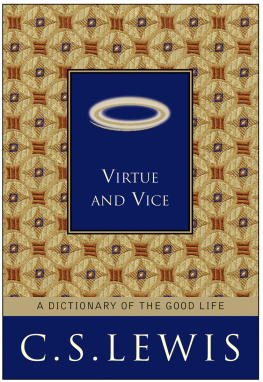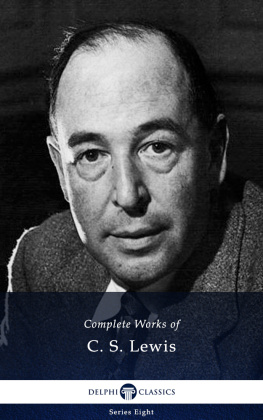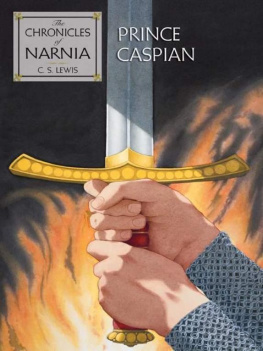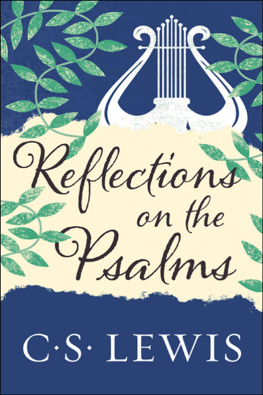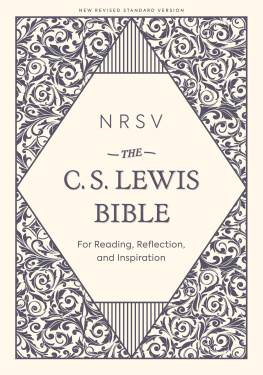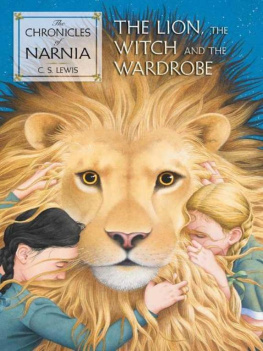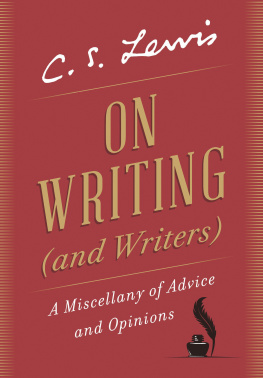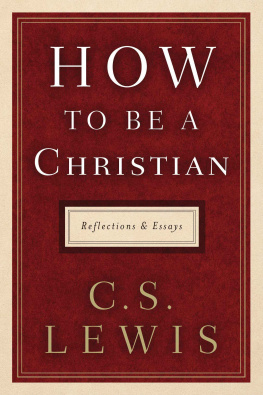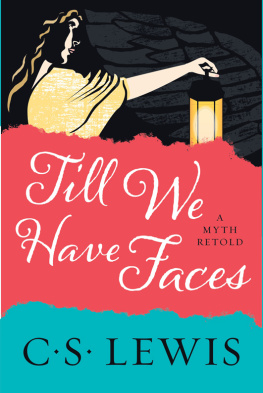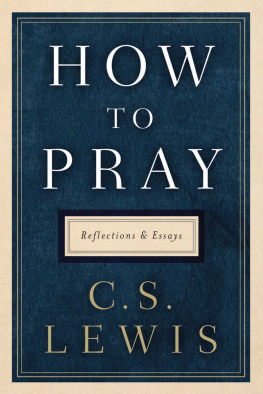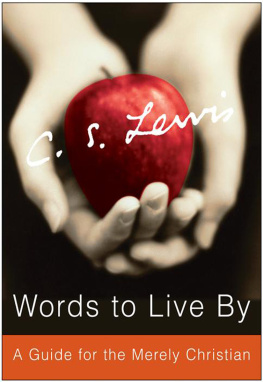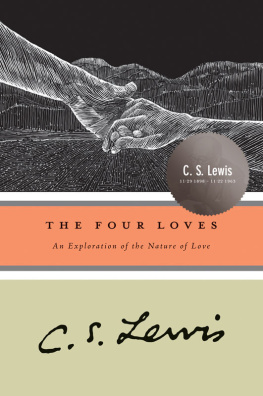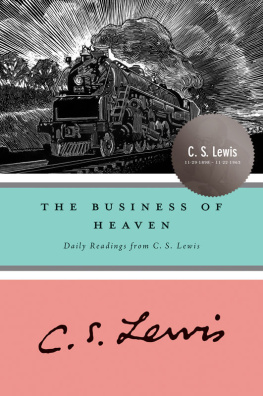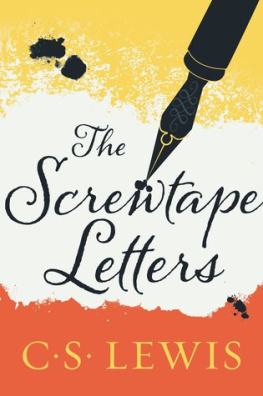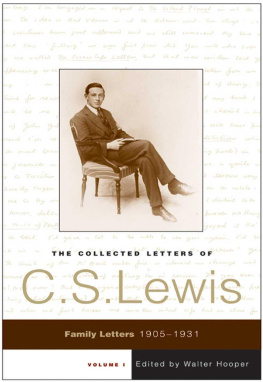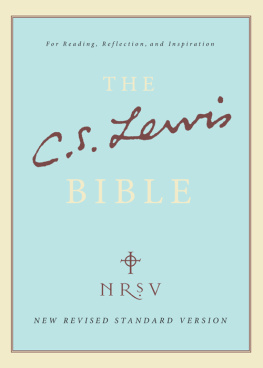Virtue and Vice
A Dictionary of the Good Life
C. S. Lewis
Edited by Patricia S. Klein

Vice and virtue . To the modern ear these words convey meanings twisted by our own culture and behavior. The word vice sounds benign, describing fundamentally harmless habits and attitudes, the kinds of things normal people do and feel. The word virtue , by contrast, communicates a prudish self-righteousness, the sort of character were not interested in being around, much less becoming.
Of course, the point of redefining these terms is to neutralize them so we can prove that were not really so bad after all. If vice is just a few bad acts, the occasional vulgarity, and, yes, okay, a bad temperbut whos perfect?then Im better than most folks. And if virtue is an annoying holier-than-thou creature, well, lets just set the record straight by proving that that persons not really so great, certainly not better than we are.
Both virtue and vice have been gutted, stripped of their power, and left empty of truth. Sadly, eviscerating the words does nothing to alter the conditions the words originally described, and then, more sadly still, we are left with no words to describe powerful and real matters. Without the words, how can we ever hope to learn, to understand, to change?
To C. S. Lewis, these words were not empty, bereft of meaning. Virtue and vice were precise terms, describing specific and vital aspects of good and evil. And for him, good and evil were the ultimate reality. In Lewiss writing, we see a vitality in the workings of good and evil in our lives. Lewis believed, We Christians think man lives for ever. Therefore, what really matters is those little marks or twists on the central, inside part of the soul which are going to turn it, in the long run, into a heavenly or a hellish creature. Virtue and vice are not simply passive indicators of character; it turns out that they are also active predictors of future character.
How does that happen? Well, it seems we are participants in shaping our own character. We get to choose; we decide whether it will be evil or good that forms our selves. But its never the big decisions that trip us up, is it? Its the little choicesthe petty untruth, the hidden pilfering, the secret lewdness, the lick of pride or cruelty or selfishness. Each small indulgence makes the next one easier. And it is the small kindness, the unexpected act of courage or forgiveness or charity or dutyeach decision for good or virtuethat makes our next decision for good that much easier. Lewis says it best: Good and evil both increase at compound interest. That is why the little decisions you and I make every day are of such infinite importance. The smallest good act today is the capture of a strategic point from which, a few months later, you may be able to go on to victories you never dreamed of. An apparently trivial indulgence in lust or anger today is the loss of a ridge or railway line or bridgehead from which the enemy may launch an attack otherwise impossible.
Few writers are better than Lewis at exploring and explaining the nuances of good and evil. Gathered here are pieces of Lewiss most vibrant writing on the fundamental matters of virtue and vicewriting in which he unwraps, unmasks, disarms, engages, and in the end, lays before us truth, vivid and irresistible. What we do with this truth, he no doubt would say, is our choice.
Patricia S. Klein
AMBITION . Ambition! We must be careful what we mean by it. If it means the desire to get ahead of other peoplewhich is what I think it does meanthen it is bad. If it means simply wanting to do a thing well, then it is good. It isnt wrong for an actor to want to act his part as well as it can possibly be acted, but the wish to have his name in bigger type than the other actors is a bad one.
CHARACTER . There is a difference between doing some particular just or temperate action and being a just or temperate man. Someone who is not a good tennis player may now and then make a good shot. What you mean by a good player is a man whose eye and muscles and nerves have been so trained by making innumerable good shots that they can now be relied on. They have a certain tone or quality which is there even when he is not playing, just as a mathematicians mind has a certain habit and outlook which is there even when he is not doing mathematics. In the same way a man who perseveres in doing just actions gets in the end a certain quality of character. Now it is that quality rather than the particular actions which we mean when we talk of a virtue.
CHARITY . Charity now means simply what used to be called almsthat is, giving to the poor. Originally it had a much wider meaning. (You can see how it got the modern sense. If a man has charity, giving to the poor is one of the most obvious things he does, and so people came to talk as if that were the whole of charity. In the same way, rhyme is the most obvious thing about poetry, and so people come to mean by poetry simply rhyme and nothing more.) Charity means Love, in the Christian sense. But love, in the Christian sense, does not mean an emotion. It is a state not of the feelings but of the will; that state of the will which we have naturally about ourselves, and must learn to have about other people.
Christian Love (or Charity) for our neighbours is quite a different thing from liking or affection. We like or are fond of some people, and not of others. It is important to understand that this natural liking is neither a sin nor a virtue, any more than your likes and dislikes in food are a sin or a virtue. It is just a fact. But, of course, what we do about it is either sinful or virtuous.
CHARITY, OR ALMS . Charitygiving to the pooris an essential part of Christian morality: in the frightening parable of the sheep and the goats it seems to be the point on which everything turns. Some people nowadays say that charity ought to be unnecessary and that instead of giving to the poor we ought to be producing a society in which there were no poor to give to. They may be quite right in saying that we ought to produce this kind of society. But if anyone thinks that, as a consequence, you can stop giving in the meantime, then he has parted company with all Christian morality. I do not believe one can settle how much we ought to give. I am afraid the only safe rule is to give more than we can spare. In other words, if our expenditure on comforts, luxuries, amusements, etc., is up to the standard common among those with the same income as our own, we are probably giving away too little. If our charities do not at all pinch or hamper us, I should say they are too small. There ought to be things we should like to do and cannot do because our charities expenditure excludes them. I am speaking now of charities in the common way. Particular cases of distress among your own relatives, friends, neighbours or employees, which God, as it were, forces upon your notice, may demand much more: even to the crippling and endangering of your own position. For many of us the great obstacle to charity lies not in our luxurious living or desire for more money, but in our fearfear of insecurity. This must often be recognised as a temptation. Sometimes our pride also hinders our charity; we are tempted to spend more than we ought on the showy forms of generosity (tipping, hospitality) and less than we ought on those who really need our help.
CHASTITY . Chastity is the most unpopular of the Christian virtues. There is no getting away from it; the Christian rule is, Either marriage, with complete faithfulness to your partner, or else total abstinence. Now this is so difficult and so contrary to our instincts, that obviously either Christianity is wrong or our sexual instinct, as it now is, has gone wrong. One or the other. Of course, being a Christian, I think it is the instinct which has gone wrong.

